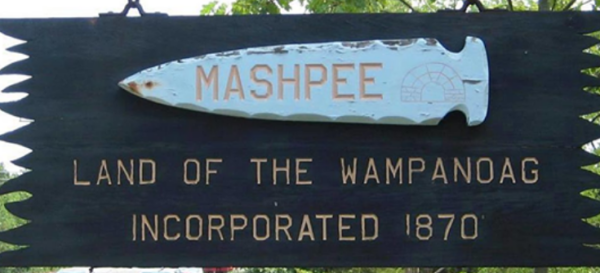
- Details
- By Levi Rickert
Breaking News
WASHINGTON — The U.S. Department of the Interior is planning to appeal the June 5 favorable federal district court ruling handed to the Mashpee Wampanoag Tribe in its battle with the Trump administration to retain its tribal land in trust.
On June 5, Judge Paul L. Friedman of the U.S. District Court for the District of Columbia ruled that the Department of Interior’s 2018 decision that the tribe was not under federal jurisdiction in 1934 was “arbitrary, capricious, an abuse of discretion and contrary to law.”
Mashpee Wampanoag Tribe Chairman Cedric Cromwell was notified late Friday afternoon of the Interior Department’s intention to appeal.
Cromwell calls the appeal a brazen move during the disproportionate impact that the COVID-19 pandemic has had on the Mashpee tribal community and the toll it's taken on the tribe’s resources.
“This action by the Secretary of the Interior shows contempt for the June 5th ruling in the District Court of D.C. Without providing the Tribe with any warning, and without providing justification or reasoning, the Secretary's action unfortunately is consistent with this Administration's constant failure to acknowledge or address the history of injustice against our Tribe and all Native Americans, and its utter lack of interest in protecting tribal lands,” Cromwell wrote in an update to his tribal citizens.
The appeal keeps the adversarial relationship between the Interior Department’s Indian Affairs and Indian Country alive. Leading national American Indian organizations and tribal officials throughout Indian Country view Indian Affairs’s stance as a serious threat to tribal sovereignty.
“The Secretary is out of step with Indian Country and with scores of both Democratic and Republican members of Congress who have called for the protection of our reservation. More to the point, the Secretary is out of step with the District Court's findings that the Department's actions against our aboriginal land are ‘arbitrary, capricious, an abuse of discretion, and contrary to law,’” Cromwell continued.
Friday’s announcement is reminiscent of Cromwell receiving a call on a Friday afternoon on Mar. 27, 2020 from a regional Bureau of Indian Affairs official telling him that Interior Secretary David Bernhardt wanted him to begin disestablishing the Mashpee reservation.
“A typical Trump administration move. They send evil Actions and news on a late Friday afternoon or early evening hoping the news won’t catch on. This is warfare against Indian Country. This is a truck colonizer ‘sneak up’ move. This behavior of the colonizer happened 400 years ago and here we are today,” Cromwell told Native News Online.
Cromwell is asking Indian Country to #StandWithMashpee.
The Department of the Interior’s Bureau of Indian Affairs could not be reached for comment.
More Stories Like This
Native News Weekly (August 25, 2024): D.C. BriefsUS Presidents in Their Own Words Concerning American Indians
Indian Gaming Association Honors the Life and Legacy of U.S. Senator Ben Nighthorse Campbell
Hoopa Tribe, BIA Contribute $20K Reward in Cold Case for Native Woman Missing for Over Three Decades
Colorado Governor Orders Flags Lowered to Half Staff to Honor Former Sen., Ben Nighthorse Campbell
Help us defend tribal sovereignty.
At Native News Online, our mission is rooted in telling the stories that strengthen sovereignty and uplift Indigenous voices — not just at year’s end, but every single day.
Because of your generosity last year, we were able to keep our reporters on the ground in tribal communities, at national gatherings and in the halls of Congress — covering the issues that matter most to Indian Country: sovereignty, culture, education, health and economic opportunity.
That support sustained us through a tough year in 2025. Now, as we look to the year ahead, we need your help right now to ensure warrior journalism remains strong — reporting that defends tribal sovereignty, amplifies Native truth, and holds power accountable.
 The stakes couldn't be higher. Your support keeps Native voices heard, Native stories told and Native sovereignty defended.
The stakes couldn't be higher. Your support keeps Native voices heard, Native stories told and Native sovereignty defended.
Stand with Warrior Journalism today.
Levi Rickert (Potawatomi), Editor & Publisher

